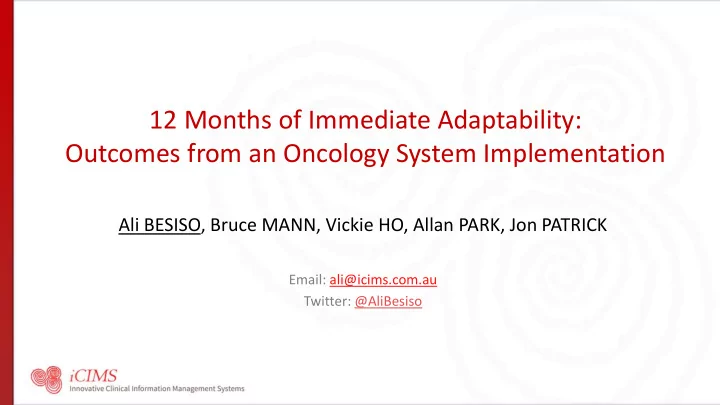

12 Months of Immediate Adaptability: Outcomes from an Oncology System Implementation Ali BESISO, Bruce MANN, Vickie HO, Allan PARK, Jon PATRICK Email: ali@icims.com.au Twitter: @AliBesiso
PROJECT BACKGROUND
Overview • What : Breast Cancer Clinical & Research Information System (RUTH II). • Where : Royal Melbourne, Royal Women’s, and Peter MacCallum Cancer Centre. • When : Went live in November 2016. • Objectives: Support multi-disciplinary care, rapidly re-design and deploy new system (CIS), and facilitate research and clinical audits.
Multi-What? Multi-Disciplinary Care “Multidisciplinary care is a collaborative approach to treatment planning and ongoing care throughout the treatment pathway” Cancer Multi-Disciplinary Meetings (MDM) “aims to ensure that members of the treatment and care team can discuss all relevant aspects of a cancer patient’s physical and psychosocial needs along with other factors impacting upon the patient’s care.” VIC Health
The MDM Lifecycle
The “Unofficial” EMR!
IMPLEMENTATION APPROACH
The iCIMS Approach Core philosophy is Immediate Adaptability • User-Controlled Design • Iterative Design and Testing • Enterprise-Wide Connectivity • No Data Lock-in (Native Data Export)
Implementation Approach • Stage 0 – Contract Preparation ( the P Monster: Procurement! ) • High Level Requirements • Stage 1 – Clinical Process Analysis ( the key step ) • Who, What, Where, When, Why • Stage 2 – System Design & Handover ( The secret recipe ) • Rapid system design and handover to users for agile-based tuning • Stage 3 – Design Adaptation Grace Period ( iCIMS unique edge ) • Final system design changes driven by users: rapid & coding-free • Stage 4 – Business As Usual (BAU) • Stage 5 – Progressive Development
Technical Implementation • Single iCIMS installation on an RMH Virtual Machine (VM). • Installed in 1 hospital, accessed by another 2 remotely: – Royal Women’s via remote apps. – Peter MacCallum Cancer Centre via VERDI. • Single HL7 exchange with hospital-wide Patient Administration System (PAS): IPM – Includes precinct specific patient merge events
PROJECT OUTCOMES
Project Timeline • June 2016 : Stage 0 (Contract Preparation) • June 2016 : Stage 1 (Analysis) and Stage 2 (Design) commence • October 2016 : Contract Signature • November 2016 : Stage 3 (Design Grace Period) commences • February 2017 : Design Adaptation Grace Period completion
Grace Period: First 3 Months of Go-Live • 93 out of 98 design change requests implemented with an average turn around time of 3 days. • Scheduled weekly releases. • No system downtime. • Clinical staff started reporting 30% time savings as an immediate result of using the system. • Minimal training!
DESIGN ADAPTATION EXAMPLES
Example 1: Consensus Reached?
Example 2:
Final Thoughts • The relationship between usability and trainability. • Immediate Adaptability is key. • The value of progressive development – understanding the “next best benefit”. • There will always be challenges – be prepared and adapt!
Acknowledgements The Parkville Precinct: • The Royal Melbourne Hospital • Peter MacCallum Cancer Centre • The Royal Women’s Hospital
Thank You!
Recommend
More recommend